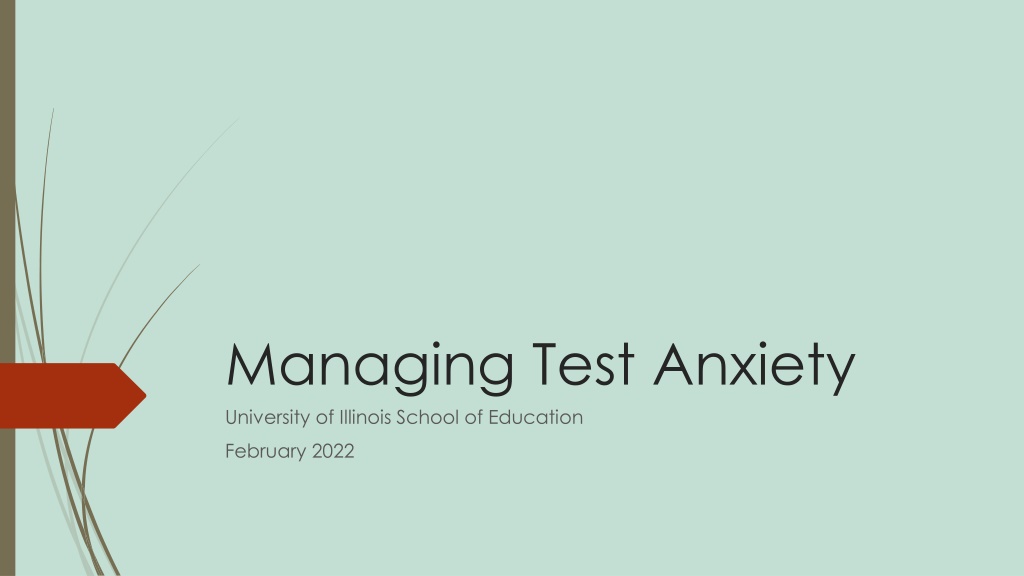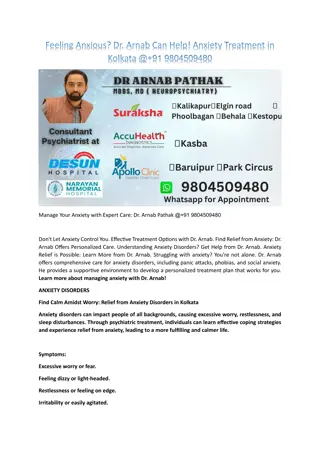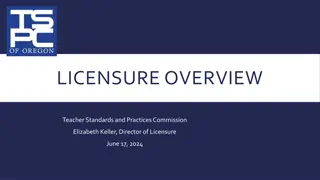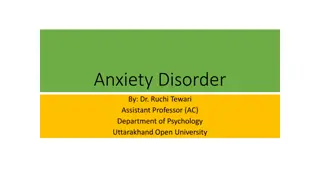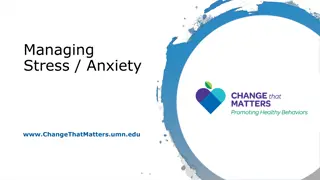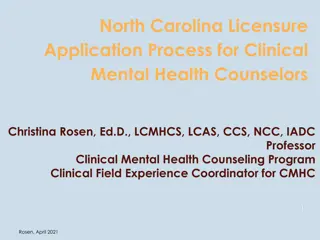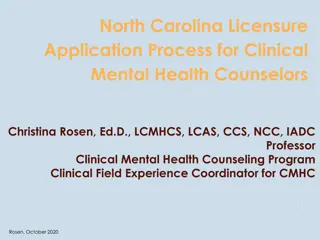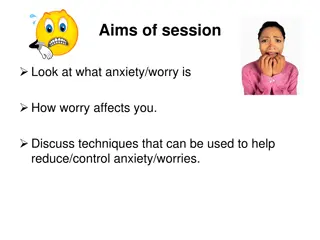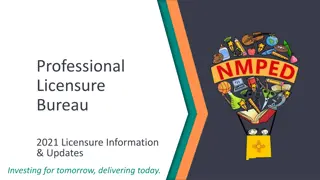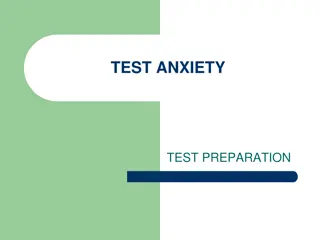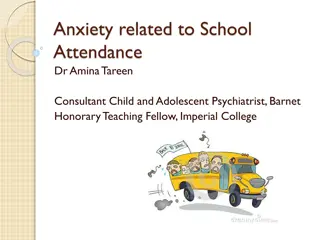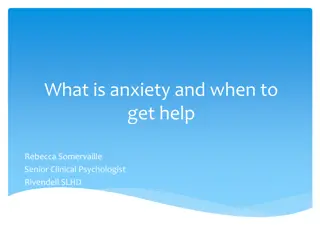Managing Test Anxiety Tips for Success in Illinois Licensure Exam
Successfully passing the Illinois licensure test requires not only content knowledge but also effective test-taking strategies and managing test anxiety. This guide provides valuable tips on addressing test anxiety before the exam, including putting things in perspective, recalling past successes, utilizing visualization techniques, controlling anxiety levels, practicing relaxation exercises, ensuring proper rest, and more. By implementing these suggestions, test takers can enhance their performance and alleviate anxiety for a successful test experience.
Download Presentation

Please find below an Image/Link to download the presentation.
The content on the website is provided AS IS for your information and personal use only. It may not be sold, licensed, or shared on other websites without obtaining consent from the author. Download presentation by click this link. If you encounter any issues during the download, it is possible that the publisher has removed the file from their server.
E N D
Presentation Transcript
Managing Test Anxiety University of Illinois School of Education February 2022
Welcome! One requirement for licensure in Illinois is passing the required Illinois licensure test (ILTS) in your program area. In addition to having the appropriate content knowledge and academic preparation for the test, to be a successful test taker, you must also use techniques to manage test anxiety. We hope you find these suggestions helpful.
Tips to address test anxiety BEFORE the exam 1 (Downs, 2017) 1. Put things in perspective. Remind yourself that your upcoming exam is important, but your entire future doesn't depend on this one test. Remember that you can retake an ILTS test as many times as you need to pass. 2. Remind yourself of past successes. Recall previous positive experiences you have had both on tests and in the classroom. 3. Don'tgive a test the power to define you. Your performance on an exam mostly depends on how effectively you study, the test-taking strategies you use, and how well you can manage test anxiety. These are all things that you can control, to some extent. Learning about the test and the type of questions that are asked can help in this regard. 4. Visualize completing the test successfully despite your anxiety. Use vivid images and play the entire "tape" in your mind from the moment you wake up on the day of the exam to the moment you finish the exam.
Tips to address test anxiety BEFORE the exam 2 (Downs, 2017) 5. A certain level of anxiety is actually helpful in performing your best. 6. Use anxiety control strategies to moderate your anxiety level if it becomes excessive. A simple Anxiety Control exercise is included in the next section. 7. Take practice tests and use them not only to work on test-taking but also to control your anxiety level. If you're afraid of not being able to finish the exam in time, do timed practice questions. 8. Get a good night's sleep for several days before the exam. With adequate sleep, your ability to think clearly and to deal with anxiety will both improve.
Tips to address test anxiety BEFORE the exam 3 (Downs, 2017) 9. Try imagining yourself as a professional athlete: ask yourself how you would prepare yourself mentally and physically for an important game. 10. Doing a moderate workout early in the evening (5:00 or 6:00) may help you sleep more soundly at night. If you often have trouble sleeping, consult your physician. 11. If you often have trouble sleeping, consult your physician.
Tips to address test anxiety BEFORE the exam 4 (Downs, 2017) 12. Reduce your intake of caffeine the day of the test. 13. Become familiar with the ILTS test process by reviewing the instructions. 14. Know how many questions and how much time you have to take the test. That way, you can pace yourself during the test. 15. Take a time-out. Practice yoga, listen to music, meditate, get a massage, or learn relaxation techniques. Stepping back from the problem helps clear your head.
Tips to address test anxiety DURING the exam 1 (Downs, 2017) 1. Get to the test site a little early. 2. Try to avoid talking with other students right before the exam. (Their anxieties may increase your own.) Instead, take a walk around the building and silently talk to yourself, meditate, breathe, and/or pray. Moving your body can help rid you of some of the nervous energy you are experiencing. 3. If possible, choose a seat in a place with few distractions (probably near the front). You might also want to bring earplugs to limit distractions. 4. Remind yourself that you don t know all the material that could possibly appear on the test and nobody else does either. Still, you can do your best to get some mileage out of what you do know. And remember you only need a score of 240 out of 300 to pass.
Tips to address test anxiety DURING the exam 2 (Downs, 2017) 5. Expect a few curve balls on the exam. Remind yourself that you're not expecting to get 100% on the exam; you only need enough points to pass! Also, your sense of what questions should appear on the test is not going to match perfectly with what the writer of the test had in mind. Therefore, when you encounter a curve ball on the exam, don t get upset and lose your concentration. Instead, you can either make an intelligent guess now or mark the question and return later. 6. If you begin to have negative thoughts, say STOP to yourself and remind yourself of past successes. 7. If you continue to feel overly anxious during the test, use the following ANXIETY CONTROL PROCEDURE (following) 8. Move your body. Roll your shoulders. Stretch your legs. Get up for a bathroom break if it's allowed.
Tips to address test anxiety DURING the exam 3 (Downs, 2017) 9. Banish all thoughts of how well or poorly you might be doing on the exam. It's hard to guess accurately, and thinking about your score will only increase your anxiety. 10.Work through the questions once rather than rushing through the exam and leaving time at the end for checking. (Nervous test-takers are especially prone to changing correct answers to incorrect when they go back to check their answers. 11.Do not obsess about running out of time on the test. Check the time periodically, but avoid checking too frequently, as this will only distract you and make you more anxious. It can be a better strategy to sacrifice a few points by not quite finishing the test than to rush through the last several questions and thus miss many points. 12.Approach your studying seriously, but think of the test as a game. Your goal is to collect as many points as you can in the time available. Don't obsess about a particularly difficult question. If you're unsure of the answer, guess and move on. Remind yourself that you can miss several questions and still do well.
Anxiety Control Procedure (Downs, 2017) Close your eyes. Breathe in slowly to the count of seven and exhale to the count of seven. Continue this slow breathing until you actually feel your body begin to relax. (Most people find that it takes 2 to 4 sequences.) Open your eyes and give yourself a positive, very specific self- talk (i.e., "You're sure to do well. You studied hard. You re doing the best you can.") This whole procedure should take only about a minute and it is well worth the time. This technique can be helpful before and during the test.
Contact UISs Counseling Center (217) 206- 7122 if you want to talk to a professional counselor about test anxiety and stress.
Retaking test Candidates sometimes do not pass a content test on the first attempt. While distressing, this should not be cause for alarm. A few things to keep in mind: It takes a few weeks before we get your test scores but we will reach out to you. You might want to so wait to hear from us before you sign up to retake a test. We only receive your test scores if you have indicated this on your test. You are not the first person to fail a test your first time. We are here to help you be successful. Please contact Dr. Nancy Barrett, nfbarret@uis.edu, School of Education s Assessment and Accreditation Coordinator for test taking assistance.
Works cited Downs, C. (2017). Managing test anxiety. Brown University. Retrieved from https://www.brown.edu/campus-life/support/counseling-and-psychological- services/index.php?%20q=managing-test-anxiety Eulberg, J. 5 strategies to bust test stress. Western Governor s University. Retrieved from 5 Strategies to Bust Test Stress (wgu.edu) Blake, S. and Shutt, C. (2013) Test anxiety: Recommendations for teachers. University of Delaware School of Education. Retrieved from https://www.education.udel.edu/wp-content/uploads/2013/01/TestAnxiety.pdf Princeton Review. Test anxiety tips. Retrieved from https://www.princetonreview.com/college-advice/test-anxiety. Special thanks to School of Education Graduate Interns Dayle Rebelsky, Megan O Brien, and Antonia Genesio for their work in gathering resources for this project
Send questions or suggestions to: Nancy Barrett BRK 377B 217-206-7517 nfbarret@uis.edu
